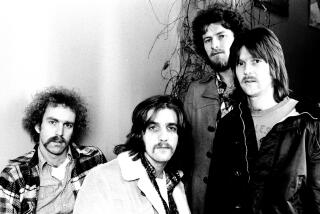Obituaries - Aug. 1, 1999
- Share via
Simon Mahlathini Nkabinde; South African Singer
Simon Mahlathini Nkabinde, 61, a singer who became a legend in South Africa while popularizing mbaqanga music internationally. He was best known for his lead vocals for the group Mahlathini and the Mhaotella Queens. Mahlathini made his first recordings in 1952 with the Dark City Sisters. Those recordings established a style that combined the lively, rolling rhythms of South African music with a strong-voiced lead male singer, or “groaner,” backed by a group of female vocalists. He went on to make a series of hit records with the Mhaotella Queens, who offered sweet, three-part harmonies to contrast with Mahlathini’s guttural sound, in the ‘60s and ‘70s. They were regarded by many as South Africa’s first “super band.” Mahlathini was said to be a major influence on the group Ladysmith Black Mambazo, which is better known to U.S. audiences. On Wednesday in Johannesburg of diabetes.
Gregory C. Minor; Expert on Nuclear Plant Safety
Gregory C. Minor, 62, one of three senior engineers who resigned from General Electric Co. to bring attention to safety concerns about nuclear plants. Minor was born in Fresno and grew up in several Northern California communities. He received a bachelor’s degree in electrical engineering from UC Berkeley in 1960 and a master’s from Stanford in 1966. He went to work for General Electric in San Jose in 1960. When he resigned he was manager of advanced control and instrumentation. He was responsible for the design of safety systems, control systems and control room layouts for the company. On Feb. 2, 1976, Minor and two associates, Dale G. Bridenbaugh and Richard G. Hubbard, resigned from their positions, each saying they had major concerns with the adequacy of plant designs, the effectiveness of nuclear regulation and the chances of human error. They also volunteered to work for Proposition 15, the California Nuclear Safeguards Initiative. In 1977, they formed MHB Technical Associates, a consulting company. Over the next 20 years, the firm conducted studies and presented testimony pertaining to the safety, reliability, construction and economic aspects of power generation facilities. In that capacity, Minor evaluated nuclear plants for the U.S. Department of Energy, the Nuclear Regulatory Commission, the General Accounting Office and various states. In 1979, the firm served as technical advisor on the movie “The China Syndrome,” a drama about an accident at a nuclear plant. And though the nuclear industry called the film unrealistic, the Three Mile Island nuclear plant in Pennsylvania had a near-meltdown shortly after the film’s release. On July 20 of cancer at his home in Telluride, Colo.
Werner Haftmann; Art Historian, Gallery Director
Werner Haftmann, 87, a former director of Berlin’s National Gallery and creator of the first Documenta modern art show. Haftmann, also a prominent art historian, was born in what is now Glowno, Poland. His best known work as an author is “Painting of the 20th Century,” which appeared in 1954 and remains a standard reference in art history. Angela Schneider, deputy director of the Berlin National Museum, said Haftmann wrote the book because he was appalled after World War II at how little Germans knew about modern art, which had been branded “degenerate” by the Nazis. Haftmann also put together the first Documenta show, which featured works by Matisse and Picasso, in Kassel in 1955 as a way to begin integrating Germany back into international cultural life. The show, held every four years, has become an important forum for contemporary artists. He also was credited with raising the international profile of Berlin’s National Gallery during his 1967-74 term as director. On Wednesday at his Bavarian home in Waakirchen, of heart failure.
More to Read
The biggest entertainment stories
Get our big stories about Hollywood, film, television, music, arts, culture and more right in your inbox as soon as they publish.
You may occasionally receive promotional content from the Los Angeles Times.









